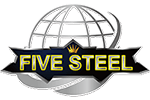For a long time, welded steel pipe has salient properties that can be utilized to advantage in buried pipelines. There are a few advantages of welded pipe for pipelines in service such as strength, ease of installation, high-flow capacity, leak resistance, long service life, reliability and versatility as well as economy in applications. However, everything will tend to change over time, so does welded steel pipe in use. For example, the issues of possible long-term seal degradation/relaxation and any need to first stem/plug the leak need to be considered.
DongPengBoDa Steel Pipe Group is a famous steel pipe manufacturer in China. We would like to provide you with a couple of considerations that should not be overlooked when you choose welded pipe for pipelines as follows:
1)Quality Assurance of Welds: it cannot be denied that longitudinal stress in welded steel pipe could possibly be limited by strength of welds. Especially, some surface treatment of steel pipe , for example, steel pipe coatings must be replaced over field welds in service.
2)Corrosion Resistance: for pipelines under soil conditions or under fluid flow conditions, it seems very necessary for you to make certain measures to protect your welded steel pipe for a longer service life. Pre galvanized steel pipe is a very popular type of welded steel pipe used for pipelines due to its galvanized coating, which can to some degree, protect steel pipe against corrosion over time.
3)Ring Deflection: regarding structural performance of buried steel pipe for pipeline, it is very important to limit vertical ring deflection to 5% during installation, which prevents disturbance of the soil embedment when the steel pipe is pressurized. Any limit less than 5% is determined by other factors than structural performance limits.
In addition, we should try to find out the possible causes for leakage in pipeline projects so as to avoid this problem with the best solution as possible. As a rule, leakage may be caused by internal or external metal loss or a combination of the two in use. For round steel pipes, leakage may also be caused by cracking of welded seams or joints or of the parent pipe itself in projects. Depending on the extent of the discovered damage, repair may require the installation of a repair clamp or the replacement of a section of pipe utilizing connectors or couplings. Nevertheless, in all cases where the pipe contents are leaking, it will be necessary to consider the suitability of the repair component to not only accommodate the pressure containment requirements, but also to accommodate corrosivity and other effects of the fluid. For example, elastomeric seals utilized in certain repair clamps/connectors may be susceptible to deterioration in the presence of volatile hydrocarbons, aromatics etc.
Send your message to us:
Post time: Apr-13-2020





